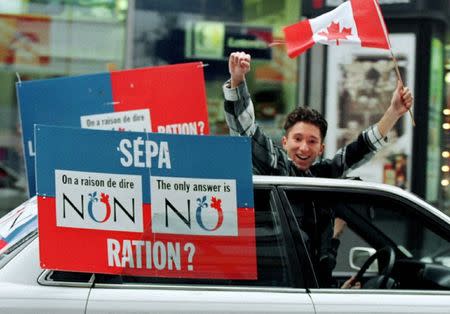Say 'Non': Quebec referendum offers lessons for pro-union UK leaders

By Randall Palmer and David Ljunggren OTTAWA (Reuters) - Canadian politicians who almost saw their country torn apart by an independence referendum in 1995 say pro-union British leaders have been slow to learn lessons from that campaign but can still take steps to win the vote Scotland will hold on Sept. 18. In a campaign with striking similarities to the Scottish vote, the predominantly French-speaking province of Quebec came within a whisker of deciding to split up Canada in the 1995 referendum, which saw support for separatism spike in the final week. In both cases an energetic Yes camp led by a charismatic figure overshadowed the No campaign, while each country's prime minister stayed on the sidelines in the belief too much involvement could fuel nationalist passions. But in an echo of Prime Minister Jean Chretien's frantic and emotional last-minute push for unity in 1995, British Prime Minister David Cameron rushed to Edinburgh this week to make a passionate appeal for the Scots to stay in Britain. Veterans of Quebec's two referendums on independence said this kind of push by Cameron should have been considered sooner but that there was still time to prevent the breakup of the United Kingdom. They are bemused by the intense focus on the negative consequences of a Yes vote on Scotland's economy, given what they see as a failure by pro-union leaders to balance those warnings with an appeal to Scots' pride in Britain. "Pride is the key aspect of the vote. It's not the only one, but if you give up this dimension of the debate, you're in trouble," said former Liberal party leader Stephane Dion, who as a member of the Liberal government in 1996 pushed through an act making it more difficult for provinces to secede. In both the Canadian and UK cases, the No camp warned about the costs and the potential loss of the national currency but found its message swamped by emotional calls for independence. Once-comfortable polling leads for unity evaporated. The 1995 Quebec referendum, which the No side won by only 50.6 percent to 49.4 percent, followed a vote in 1980 that it won by 60 to 40 percent. Dion said the hugely successful 1980 No campaign was notable for its stress on pride in Canada. Former Liberal MP David Collenette said the 1980 No campaign also succeeded because then-Prime Minister Pierre Trudeau allowed firebrand politician Chretien to make the case for unity every day. But 15 years later, when Chretien himself was prime minister, he took a much more hands-off approach. In part this was because the Quebec provincial Liberals - who were running the No campaign - worried that if Ottawa assumed too high a profile it could push voters into the Yes camp. Former ministers think that was a mistake because Chretien was their best campaigner and it left the field to the Yes side. "CAPTAIN CANADA" In the week running up the Quebec vote, Chretien made an unprecedented national televised appeal and authorized Brian Tobin, an ardent federalist member of government who was dubbed "Captain Canada," to organize a pro-unity rally in Montreal, the largest city in Quebec. An enduring image is of an enormous maple-leaf flag rippling over a crowd of 150,000 Canadians, mostly from outside Montreal. Many had flown in on 10-percent "unity" fares sponsored by the national airlines. "This is no time to get demoralized," Tobin said, referring to the pro-union campaign in Britain. Quebec referendum veterans said the British No camp should consider a similar rally in the remaining days before the vote. That said, opinions inside the Canadian cabinet were split as to whether the Montreal rally did more harm than good. Collenette, who was defense minister at the time, is still convinced the event sent a crucial message. "It really had an impact on voters in Quebec who said 'Well, all these people are coming from the rest of Canada, they really do want us in'," he said. The Canadian veterans also urged pro-union Scots to pursue a more aggressive on-the-ground campaign. "What you need are people with pamphlets in their hands glad-handing, door to door, inside the pubs, shaking, telling them, 'Hang in with us.' It's hand-to-hand combat," said former Liberal cabinet minister Don Boudria. While Canadian federalists are offering advice to Scotland's No camp, Canadian separatists are heading to Scotland to learn the lessons of Scottish leader Alex Salmond's Yes campaign, which has seen a surge in support in recent weeks. "Quebec’s independence movement should be inspired by what we see in Scotland," said Alexandre Cloutier, a member of Quebec’s provincial parliament and potential candidate for leader of the separatist Parti Québécois. In addition to Cloutier and two other PQ elected officials, a delegation of about 40 pro-independence observers from Quebec will be traveling to Scotland next week. (Additional reporting by Allison Lampert, Editing by Jeffrey Hodgson and Ross Colvin)

